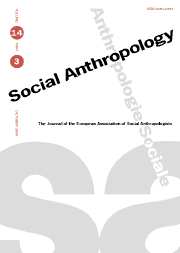Article contents
Synchronisations among the Orokaiva
Published online by Cambridge University Press: 01 October 1999
Abstract
In anthropology, the debate on time traditionally opposes the universalists to the relativists. This article attempts to escape the opposition, claiming that while anthropology cannot demonstrate the existence of a universal individual notion of time, it can unveil a number of general characteristics of ‘social time’ which transcends the relativity of its representations. Using a Papua New-Guinean case study, a minimal definition of ‘social time’ is then provided, along with the hypothesis that every society requires at least two different and hierarchically ordered conceptions of time. This co-existence of diverse times questions in turn the category of history as an analytical tool in anthropology.
- Type
- Research Article
- Information
- Copyright
- © 1999 Cambridge University Press
- 5
- Cited by


